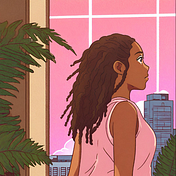
Allison Wiltz
Friend of Medium
Black womanist Scholar bylines @ Momentum, Oprah Daily, ZORA, GEN, EIC of Cultured #WEOC Founder allisonthedailywriter.com https://ko-fi.com/allyfromnola

Friend of Medium
Black womanist Scholar bylines @ Momentum, Oprah Daily, ZORA, GEN, EIC of Cultured #WEOC Founder allisonthedailywriter.com https://ko-fi.com/allyfromnola